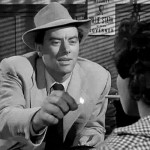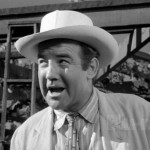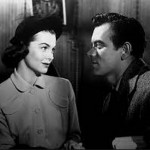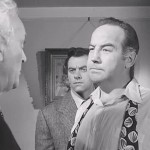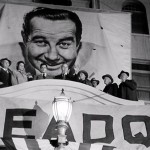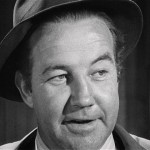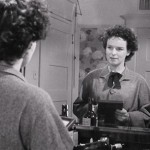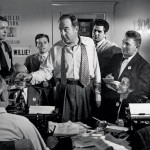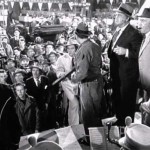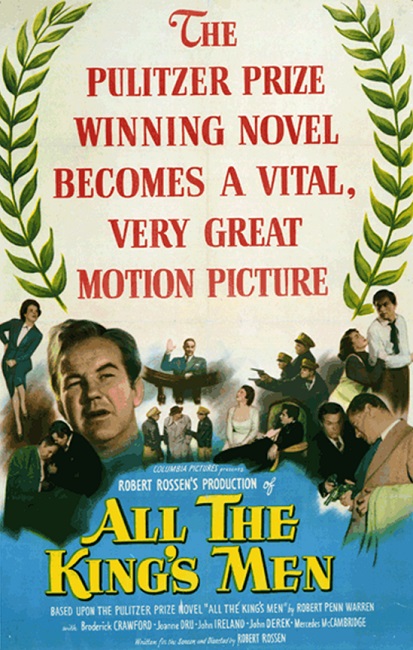
All the King’s Men – 1949
This movie was a political drama, first and foremost. As such, I have to admit that I went into it with a half-way closed mind. I didn’t particularly care for the movie, simply because I have never been a great follower of politics. The plot follows the career of Willie Stark, played by Broderick Crawford, as he changes from a poor but honest farmer fighting against local injustice by running for a small and unimportant office, to a wealthy state governor who is as corrupt as the day is long.
Interesting Note: The author of the novel on which the movie was based was a Pulitzer Prize winner for the book. The character of Willie Stark was thought to be inspired by the real-life politician Huey P. Long, former Governor of Louisiana, and a Louisiana Senator in the mid-1930s
Sometimes it was unclear whether the main character is Stark or the young reporter, Jack Burden, played by John Ireland, that is assigned to cover his story, and later comes to work for him. Jack is associated with and is friends with Judge Monte Stanton. He also happens to be in a relationship with the judge’s niece, Anne Stanton, played by Joanne Dru.
I couldn’t stand the character of Anne Stanton. She is shallow and dishonest. I mean, sure, she wasn’t the only character with realistic flaws, but she seemed even more flawed than the rest. She lives as a ward of the Judge and when Jack asks for her to wait for him, to give him time to build some kind of a successful career so that he can keep her in the lifestyle to which she is accustomed, she promises that she will. But as soon as she meets Willie Stark, she is smitten with his power and position. She kicks Jack to the curb and starts an affair with him. Tough break, Jack!
Later, even when the corrupt Willie is about to end his relationship with her, she takes the opportunity to throw her uncle, the Judge, under the bus. And then when Jack confronts her about it, she sobs and cries and turns her face away from him, not able to face what she has done. She is a liar, a back-stabber, and an all-around bad person.
But enough about the weak and spineless behavior of her character.
The real focus of the film can be summed up in the famous quote by Sir John Dalberg-Acton, “Power tends to corrupt and absolute power corrupts absolutely.” The film-makers seemed to go out of their way to demonstrate this point. That phrase may be true, but in this case, I have to question how true.
By the end of the movie, Stark was such a popular politician that when attending his own impeachment hearing, a crowd of supporters stood outside the courthouse for an entire day, shouting his name. What the crowd didn’t know was that his power and position were gained by suppressing, stepping on and, in one case, even murdering his opponents and enemies. He had become a habitual alcoholic and notorious womanizer. He was a tyrannical father and husband, and a master at manipulating those who worked for him.
So we have to ask, why did the people love him so much? Why did I sometimes admire his character? Because despite all his amoral and sometimes criminal behavior, he made promises to his voters which he honored. Sure, he bulldozed over people to do it, but he got it done. Roads were built along with a hospital and schools – all things that greatly improved the state of Louisiana. His supporters just didn’t know all the dirty business.
In the end, the movie was a bit too slow-paced for my tastes, and the subject matter was not really one in which I am interested. But, that being said, I will say that I thought Broderick Crawford did a good job. He was believable as both the poor but honest man, and as the rich but corrupt politician. John Ireland acted his part well enough, but for one thing. From the very beginning, he had a look on his face that made him seem perpetually annoyed, even when he had no reason to be.
One actress in the film that I enjoyed watching was Mercedes McCambridge as Sadie Burke, Stark’s personal assistant. She had an intensity about her that was reflected in her performance. The script didn’t focus on her very much, but what was there was golden. There was a small scene in which she is looking at her face in the mirror, acknowledging that she is not as high born or as pretty as Anne Stanton, and wishing that she was attractive enough to catch Willie’s attention. The inferiority, jealousy, and bitterness in that little scene was incredibly well acted. I actually felt a great amount of sympathy for her in that moment. McCambridge won the Academy Award for Best Supporting Actress for the role. Well done Mercedes!
Interesting Note: Director, Robert Rossen originally offered the starring role to John Wayne, who found the proposed film script unpatriotic and indignantly refused the part. Crawford, who eventually took the role, won the 1949 Academy Award for Best Actor, beating out Wayne, who had been nominated for his role in Sands of Iwo Jima.
